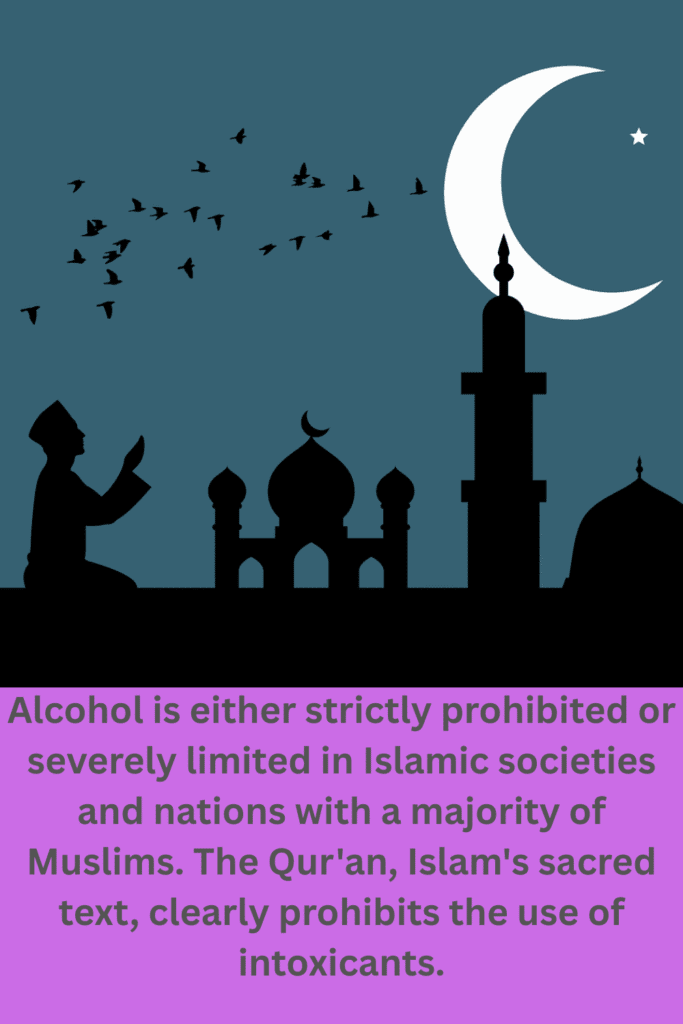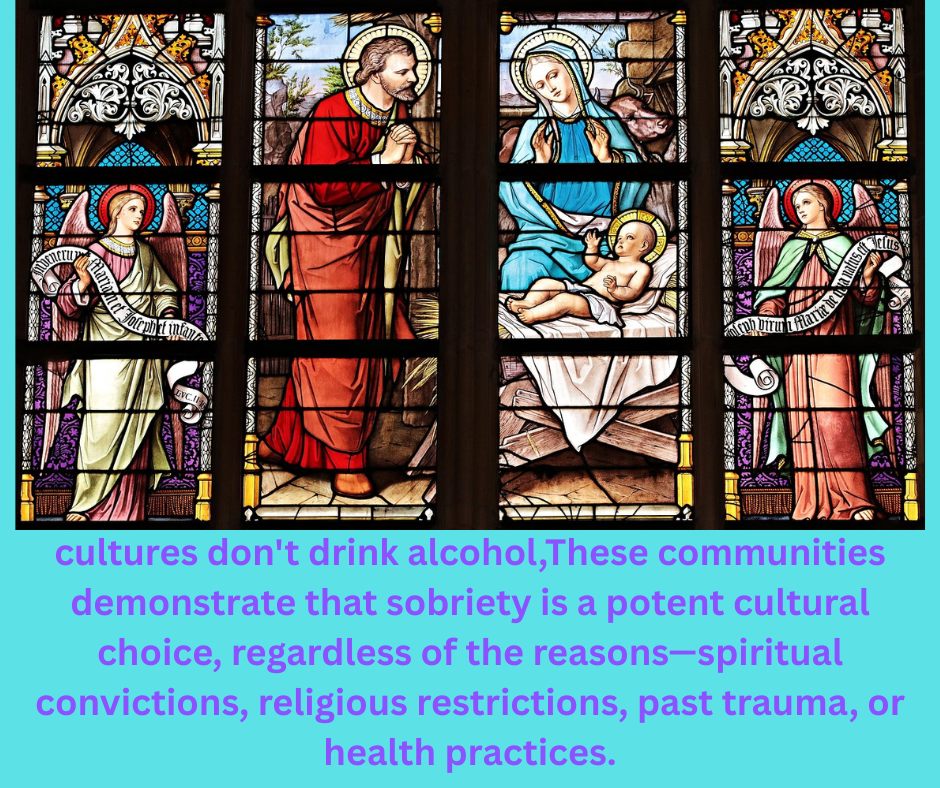cultures don’t drink alcohol,Many cultures all throughout the world place a high value on alcohol. Alcohol consumption has long been regarded a tradition, ranging from simple social gatherings to religious rites. But not every culture accepts drinking alcohol. In actuality, several communities, civilizations, and religious organizations abstain from alcohol completely for a variety of reasons, including health, spirituality, social conventions, and past experiences. What are the societies that do not consume alcohol, and why?

We examine the various societies and civilizations around the world where alcohol is prohibited or banned in this post. We’ll also talk about the principles and convictions that underlie these decisions, providing viewpoints on alcohol-free living from a social, cultural, and religious standpoint.
Table of Contents
Islamic Cultures
Alcohol is either strictly prohibited or severely limited in Islamic societies and nations with a majority of Muslims. The Qur’an, Islam’s sacred text, clearly prohibits the use of intoxicants. Alcohol is therefore prohibited or very difficult to purchase in nations including Saudi Arabia, Iran, Pakistan, Kuwait, Afghanistan, Libya, and Somalia.
cultures don’t drink alcohol,Alcohol is controlled and frequently prohibited for Muslims, even in more moderate Islamic countries like Indonesia, Malaysia, or the United Arab Emirates. On occasion, nevertheless, non-Muslims are allowed in particular areas.
Why They Don’t Drink:
According to Islam, alcohol is the “handiwork of Satan” (Qur’an 5:90) and causes sin, violence, and a forgetfulness of God. It is believed that sobriety is a sign of devotion and a spiritual discipline.
Sikh Culture — Absolute Abstinence from Alcohol
Alcohol consumption is strictly forbidden in the Sikh religion, which has its roots in Punjab, India. Sikhs hold that using drugs impairs one’s ability to regulate oneself and one’s relationship with God.
Many pious Sikhs abstain from alcohol completely in societies and countries where Sikhism is prevalent, such as Punjab, India; the Sikh diaspora in Canada, the United Kingdom, the United States, and Australia.
Why They Don’t Drink:
The sacred text of Sikhism, the Guru Granth Sahib, cautions against drunkenness. cultures don’t drink alcohol,The group of initiated Sikhs known as the Khalsa are prohibited from using drugs, alcohol, or tobacco. Spiritual development requires a pure body and mind.
Buddhist Cultures — Alcohol Discouraged or Banned
Alcohol consumption is discouraged in traditional Buddhist communities. Because intoxicants impair awareness and obscure the mind, the Fifth Precept of Buddhism counsels adherents to abstain from them.
Buddhism is strongly opposed to alcohol in the following Buddhist cultures: Thailand, Myanmar (Burma), Sri Lanka, Bhutan, and Tibet.
It is strictly forbidden to consume alcohol in monastic communities. While extensive drinking is frowned upon in the broader public, moderate use may be accepted.
Why They Don’t Drink:
Buddhists seek enlightenment via detachment, discipline, and mental clarity. It is believed that alcohol stands in the way of this spiritual journey.
Certain Indigenous Cultures — Alcohol Caution Due to Historical Trauma
Due to the social and health issues that alcohol has brought over the years, several Indigenous tribes, especially in North America, Australia, and New Zealand, practice alcohol abstinence. This is not because of religious belief.
Indigenous communities in Australia, Native American tribes in the United States, First Nations in Canada, and Māori communities in New Zealand are a few examples of groups that have alcohol prohibitions or limitations.

To safeguard the next generation, many tribal councils or elders have decided to restrict or outlaw alcohol in their communities.
Why They Don’t Drink:
Alcohol was first introduced to indigenous communities throughout colonialism, and it quickly became a source of addiction, poverty, violence, and health issues. cultures don’t drink alcohol,Many Indigenous groups now equate alcohol with devastation rather than celebration.
Hindu Ascetic Cultures — Spiritual Abstinence
Although alcohol is not strictly forbidden in Hinduism, the religion’s austere customs encourage complete abstention. Alcohol is not used by spiritual seekers like Sadhus, Yogis, and Brahmacharis since it is thought to be detrimental to their spiritual practice. Communities that practice Ayurveda, yoga, and meditation in several regions of India and Nepal frequently abstain from alcohol entirely.
Why They Don’t Drink:
Self-control, mental clarity, and disengagement from sensuous pleasures are the goals of Hindu ascetics. Alcohol impairs spiritual development, interferes with meditation, and raises tamas (dark, dull energy).
Dry Communities in the United States
Although the United States is frequently linked to excessive alcohol use, there are hundreds of “dry counties” in states like Mississippi, Kentucky, Arkansas, Tennessee, and Alabama.
cultures don’t drink alcohol,The selling of alcohol is restricted or outright forbidden in several counties. Christian Protestant groups who oppose alcohol, such as Baptists, Methodists, and Evangelicals, frequently have an impact on these regulations.
The Reasons behind Their Absence of Alcohol:
These groups, which have been influenced by historical movements such as Prohibition and biblical teachings, hold that alcohol causes violence, sin, and the disintegration of families and society.
Alcohol in Mormon Culture Completely Prohibited
The Word of Wisdom, a health code adhered to by members of The Church of Jesus Christ of Latter-day Saints (Mormons), forbids the use of alcohol, tobacco, coffee, and other dangerous substances.
Alcohol consumption is strongly discouraged in Mormon-majority regions such as Utah, USA, and portions of Idaho and Arizona.
The Reasons behind Their Absence of Alcohol:
- • The founder of the church, Joseph Smith, received the Word of Wisdom as a decree from God. Mormons think that following this rule improves both one’s bodily and spiritual well-being.8. The Straight Edge Subculture: A Modern Alcohol Disturbance
- The Straight Edge movement, which originated in the 1980s punk rock scene, advocates for a drug-, alcohol-, and tobacco-free lifestyle. It is a cultural movement founded on self-control, ethics, and clarity, but it is not religious.
- This subculture can be found all around the world, including:
- The United States
- Europe
- South America
- Japan
Why They Don’t Drink:
Straight Edge members believe that living a true life necessitates a clean body and mind. They refuse to submit to peer pressure to use drugs or alcohol.
The Total Prohibition of Alcohol in Jainism
Alcohol is absolutely forbidden to adherents of the Indian faith known as Jainism. Jains lead a life of self-discipline, non-violence, and non-possessiveness, cultures don’t drink alcohol,which includes abstaining from drugs that cloud judgment.
Most Jains live in the United States (diaspora), the United Kingdom, and India (Gujarat, Rajasthan, and Maharashtra).
The Reasons behind Their Absence of Alcohol:
Alcohol violates the Jain concept of ahimsa (non-violence) since it is regarded as a fermented product that contains live forms. Additionally, it distorts the intellect, making it more difficult to adhere to moral and religious principles.
Conclusion :
Despite the fact that alcohol is widely consumed worldwide, many cultures, religions, and groups forbid or discourage its use. cultures don’t drink alcohol,These communities demonstrate that sobriety is a potent cultural choice, regardless of the reasons—spiritual convictions, religious restrictions, past trauma, or health practices.
The answer encompasses both traditional and contemporary ideals, ranging from the religious precepts of Islam, Sikhism, and Jainism to the discipline of Buddhist and Hindu spiritual paths and even the social choices of contemporary subcultures like Straight Edge.